Inside the cut-throat hustle to make it as a Hong Kong ‘shopping agent’
By Joey Yang & Eva Qiu
HKU Journalism and Media Studies Centre
HONG KONG – After driving the car slowly into a warehouse under a freeway in Tuen Mun, Kit Fung unloads a full load of goods from his car onto the ground in the yard. His two colleagues drive the other two cars parked in the corner of the yard to the side, before loading goods into vehicles according to different delivery destinations.
In the process, a packaged box of baked puffs fell to the ground. Fung picked it up, then threw it into the trash bag next to him. He returned to the car seat and used the phone to call another colleague, asking the colleague to inform the customer that the box of puffs was gone today.
In the mad rush to buy and deliver goods for customers, there’s no time to fuss over a box of damaged baked goods.
Before the pandemic in 2020, many mainlanders flocked to Hong Kong to buy products such as milk powder, cosmetics, medicated oil, and luxury items. However, not all mainlanders had the time or the necessary visa to travel to Hong Kong. Therefore, shopping agents came into being. They bought goods in Hong Kong and took them to the mainland for sale, charging a fee on top of the retail price of the goods they bought to make money.


Tuen Mun, Fung’s unloading point, staging area
However, things are rapidly reversed. There are more Hong Kong-based agents shopping in mainland than mainland-based shopping agents shopping in Hong Kong these days. Many Hong Kong people like Fung are transferring products from megastores and chain stores in mainland to Hong Kong for sale.
It’s a highly competitive, if not cut-throat business. Fung readily admits that “there are too many shopping agents from Hong Kong” and that he can often do little more than earn his gas money back when ferrying goods across the border from megastores in Shenzhen. Nevertheless, the demand is there and he’s looking for other ways to thrive in this emerging industry.
Hong Kong residents purchase a diverse range of goods in the mainland, from frozen dumplings and instant noodles to large appliances like tea kettles and vacuum cleaners. Among shops in Shenzhen, popular destinations for Hong Kong shoppers include Sam’s Club and Costco. These two megastores haven’t entered Hong Kong, so Hong Kongers can only buy goods exclusively from them in Shenzhen or buy goods from shopping agents.
Shopping:
Including snacks, home appliances, clothes etc.
Beauty industry:
Including massage, facial, teeth cleaning etc.
Catering:
Including hotpot, cuisines, cafe etc.
Dozens of public groups come out when searching for “Sam’s Club /Costco shopping agent” on facebook. The most popular one has 74,000 members. Hundreds of posts are published to seek or offer shopping agent service every day.
“Super sweet mangoes with lots of flesh and a thin core. Same day delivery for orders placed before 10 a.m.”, posted by Jeng Ch, a shopping agent who promotes himself on one of these Facebook groups.
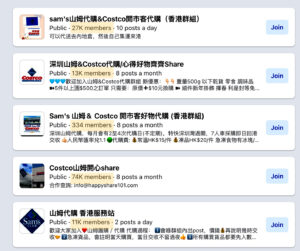
On Facebook, groups related to cross-border shopping agency attract lots of users
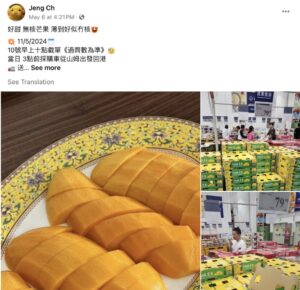
A post offering shopping agent service on a Facebook group
However, such behavior is not permitted by Sam’s Club and Costco because they are only open to their members who have paid the annual fee. The Hotline of Sam’s Club China stated on the phone call that it doesn’t allow agents to shop at its stores and has a system to detect them. A recent report from the South China Morning Post suggests Sam’s Club is seeking to put agents out of business altogether by launching free delivery to Hong Kong for high-priced orders.
“This kind of purchasing agency is currently not supported, but there is still no clear way to prevent them from doing this,” said the public relation department of Costco Shenzhen, referring to shopping agents. After sending questions about the purchasing agency on Costco’s “Contact Us” page, Costco Shenzhen called back and responded.

Fung discussing the potential delivery service of Sam’s Club with his colleagues
Undeterred, Fung vows to find a way to make it in the shopping agent business.
“Most of our current orders are only around HK$300. Sam’s Club is still not sure whether it could deliver goods to the doorstep, but we can. I believe we will still have some space for us in the future,” Fung said.
Fung posts in these Facebook groups to promote himself and to get customers into his own WhatsApp group. There are currently 740 people in Fung’s group and new customers are joining every day. Customers will share their experiences about different products and discuss which ones are worth buying.
The costs of border crossing can be offset by making large purchases, which creates a business opportunity for cross-border shopping agents. Additionally, Hong Kong license plate private cars can’t go to the mainland easily. Private car owners from Hong Kong can only obtain a mainland license plate if they pay over HK$150,000 in taxes in the mainland each year. As a result, successful small business owners with investment experience in the mainland are the most suitable candidates to be cross-border shopping agents.
At the same time, Hong Kong doesn’t levy tariffs or impose quotas on goods purchased in the mainland, which makes cross-border shopping more convenient for agents.
A day in Fung’s shoes
In March, Fung’s store had just been online for less than a month. To meet the needs of customers’ orders, he set off from Tuen Mun at noon every weekday and went to three megastores in Shenzhen to complete his purchases for customers.
From 12:00 p.m. to 20:00 p.m., over 8 hours in Shenzhen, the driving mileage in a single day was more than 100km. He drove from Tuen Mun to Shenzhen and went to two Sam’s Clubs and a Costco to make purchases. After loading his car with all the merchandise, he finally drove back to the warehouse in Tuen Mun. But his work was far from being done. After driving from Hong Kong to Shenzhen to buy and transport goods back to Hong Kong, he has to sort the orders, respond to customers’ inquiries, and deliver the goods to their doorstep.
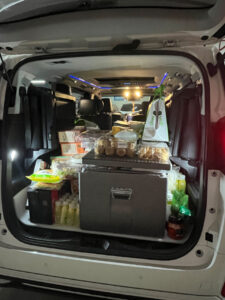
All products Fung brought back from Shenzhen that day
Sharley Wong has been using the shopping agent services for several months, once a week on average. In Fung’s group, she likes sharing products she bought through Fung and her experience in using them. She bought a box of soy milk from Fung that night.
In her opinion, these shopping agents had good service attitudes and could deliver products to clients’ doorstep. Besides, the prices of the goods were not more expensive than those in local supermarkets in Hong Kong.
“I think the food they bring back from mainland is of better quality. Like soy milk, it has a stronger flavor than the version sold in Hong Kong”
After unloading the goods from his and his colleague’s cars, Fung was finally able to drive home. Up until this point, he had not sat down to eat in almost 10 hours.
And after a busy day buying cakes, breads, instant noodles, and different kinds of snacks for five orders around Hong Kong, he and his three colleagues will only have around HK$200 gross profit per person.
Just like Fung’s shopping agent service, numerous online shopping agents advertise their businesses. However, they all encounter a common challenge of having limited profit margins. Since the prices of goods in Shenzhen are transparent, if an agent slightly increases the selling price, customers will seek out cheaper alternatives.
For example, a box of six packs of frozen burgers is priced at 89.9 yuan (about HK$97) on the official website of Sam’s Club. Fung needs to charge HK$134 to make a profit, but other agents list it for HK$119 or even less. Consequently, most agents either attract more orders through superior service and after-sales support or explore other methods to expand their business.
The shopping agent business, though already difficult enough, may become more difficult still. According to the South China Morning Post, after paying an annual fee of 260 yuan (HK$281) to become a member of Sam’s Club Hong Kong customers can enjoy free delivery service as long as they make a single purchase of 599 yuan (HK$647) or more. Costco also admitted that a similar policy for Hong Kong delivery service was under discussion, but without any details yet.
As a newcomer in this highly competitive industry, after two months without being able to cover the cost of hiring people to help him, Fung came to a stop in April. One of his colleagues, Bon Lau, also left him.
“It makes no money at all,” Lau said.
However, after a 10-day pause, Fung figured out new ways to make profits as a shopping agent.
Making money as a loss leader
Fung’s competitors include a couple Korsf Lee and Phoebe Lam. Before they joined the shopping agent business, Lee was the boss of an interior decoration company, Lam was the owner of a frozen meat store. When the trend of Hong Kong people going to the mainland to shop started last year, they became one of the first shopping agents in Hong Kong in July last year, helping people buy Sam’s Club products.
Lam’s frozen meat store is in Tsuen Wan, on the second floor of a boutique mall. She has two stores on that floor. One is close to the lift with a more centered space, that is the frozen meat store where Lam operated her business. The other one is in the corner, where they lock it up and use it as a warehouse for the frozen meat shop.
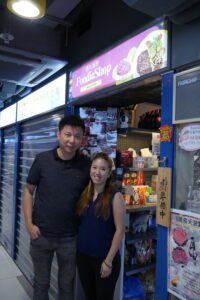
Korsf Lee and Phoebe Lam stand before their frozen meat store
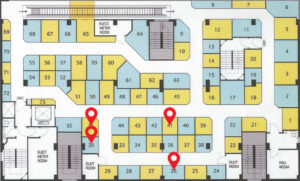
Lee’s and Lam’s stores are on the same floor, but not together
The mall had light foot traffic. Lee said customers only came when they needed something. Most stores remained closed during workdays.
In July 2023, Lee used Lam’s frozen meat shop as his base to sell products purchased from Sam’s Club, but soon there was not enough space.
“When we first started working as shopping agents, the business was very good. There was even no room for me to stand in the frozen meat store since all the shelves were filled, even the floor was almost full of stuff,” Lam said.
Lee soon decided to rent two more stores on the same floor like Lam’s frozen meat store, specifically for their Sam’s Club shopping agent business. Because the store serves as the front, it is closer to the lift than his wife’s frozen meat store. He no longer goes to Sam’s Club every day to buy goods like he did last year, but instead tries to fill his car as much as possible every time he goes to Sam’s Club. When Lee is away, Lam also takes care of the business of Lee’s store. At the same time, Lee encourages his clients to go to the frozen meat store and the shopping agent store by setting lower margins than other competitors. He sells those products only with a 10% gross margin.
Selling the same set of frozen burgers as Fung, Lee set his price at HK$110, which was probably the cheapest among all shopping agents. As competition in the shopping agency business became increasingly fierce, he decided to use his shopping agency as a “loss leader” – a low-priced item designed to attract customers to more profitable items placed nearby. His aim was to drive consumer flow for their frozen meat store through the shopping agency business. Besides the frozen meat store, they further expanded their business into locally made stew, cross-border taxi service, mainland phone cards, and promotions for restaurants in Shenzhen. He calls the regular customers he accumulated through his shopping agency business “friends”, he said he had never expected to have thousands of friends who would support his business.
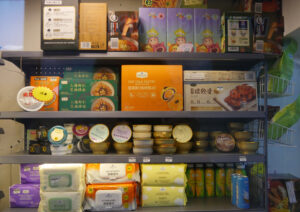 Besides selling Sam’s products with low margin, he also breaks down packaged goods and sells them in smaller units
Besides selling Sam’s products with low margin, he also breaks down packaged goods and sells them in smaller units
“It is always easier to ask thousands of people to give me a dollar each than to ask one person to give me thousands of dollars,” Lee said.
Though they did not calculate the specific profit data, both Lee and Lam said the customer flow increased more than 50% compared with days before taking the shopping agency business. In addition, they had customer WhatsApp groups with more than 3,000 members.
In those groups, Lee and Lam update information about the new products they purchased from the mainland and the different imported meats newly arrived at their frozen meat store frequently. When Lee once introduced his newly purchased hair removal devices from the mainland, it made the group members excited. Compared with the prices in Hong Kong stores, Lee’s prices were 50% cheaper. The price advantage prompted happy customers to publicly share their experiences of using hair removal devices in the WhatsApp group.
“It’s so cheap to buy from you. The old model I bought during the sale a few months ago was much more expensive than this one I bought from you,” a customer said in the WhatsApp group.
Exploring all potential sources of supply
When Fung paused his business, many clients asked why he stopped and when he would restart. This gave Fung a stronger confidence to restart the shopping agent business in mid-April, but he also realized that he should not only depend on Sam’s Club and Costco; the competition was simply too fierce.
Like what Lee had done, Fung started to diversify his sources of supply. In May, he expanded the types of goods he purchased on behalf of customers to include cheesecakes and flowers. Fung also plans to add a new clothing category. Nowadays, he can complete around 20 orders at a time when he goes shopping in Shenzhen.
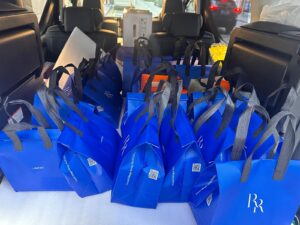
On the day before Mother’s Day, Fung got more than 20 orders of cake
Fung said these added categories can not only enrich the variety of products in his business but also increase the profit of each product. For cheesecakes, it does not require too much time to purchase. Fung only needs to pick up the cakes at the door of the cheesecake chain store and take them away. In addition, he also got the contact information of the store manager. The manager could help him set aside the cakes or notify him to pick up the cakes when there are few customers.
At the bakery store in Shenzhen, the cake cost about 49 yuan (HK$54). When Fung took it back to Hong Kong, it was worth HK$95 on his web page. Since the purchase did not take much time, plus this cake was very popular among Fung’s customers, he could earn more profit from it. On days when the order volume was high, he said there would be more than 20 orders including cakes, which meant these cakes could bring Fung and his colleagues an extra gross profit of around HK$800.
But the real money was in bringing packaged bouquets from Shenzhen to Hong Kong for sale. Unlike products he purchased on behalf of others before, like baked puffs, the prices of bouquets are not transparent and vary greatly depending on the season, the location of the store, and the florist owners’ preferences. Fung can keep the purchase price of flowers as low as possible by cooperating with florists in the mainland.
The opacity of flower prices is also the same when Fung sells these flowers in Hong Kong. Unlike other products, he posted photos of flowers in WhatsApp groups only, instead of posting on his web page. Just a few days before Mother’s Day, he went to Shenzhen to purchase flowers for four days. He could complete more than 20 orders of flowers every day, with more than HK$15,000 gross profit in total. These bouquets consist of 10 to 20 flowers each. In Shenzhen, each of them cost around HK$150. When Fung sold them in Hong Kong, the prices were about HK$300 to HK$500 each.
The success of selling mainland bouquets inspired Fung to sell mainland T-shirts in Hong Kong. He planned to order a batch of T-shirts from a mainland clothing wholesale market at a cost of about 50 yuan (HK$54) per piece. By adding some customized graphics and shipping them down to Hong Kong for sale, he believed these T-shirts could be sold for nearly HK$300 each.

By cooperating with flower shops, Fung tried to reduce the cost of buying flowers
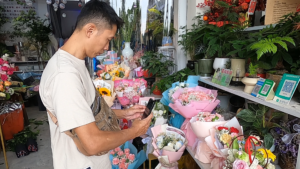
Fung updates the styles of what he offers to clients by taking pictures of flowers
He couldn’t wait to launch this idea and planned to go to the wholesale market to reach a deal with the shop owner within two weeks.
He also wanted to start this business on his website as soon as possible. Though the T-shirts didn’t even have a layout and were not ready for sale, he has added a blank product category specially for the T-shirts on his website.
“I feel that I haven’t fully figured out the logic of my products on my website, so I don’t dare to expand my business further,” Fung said. “But I have been able to earn more money than before, so I believe I am on the right track and I can do better.”
Produced by:
Joey Yang & Eva Qiu
Mentor: Cezary Podkul
Joey Yang: contact interviewees, interviews, draft text, film and edit videos, edit webpage
Eva Qiu: draft text, design web layout, film, create web interactions
Special thanks to: Foon Lee, Kit Fung, and all people who supported us during the producing process
